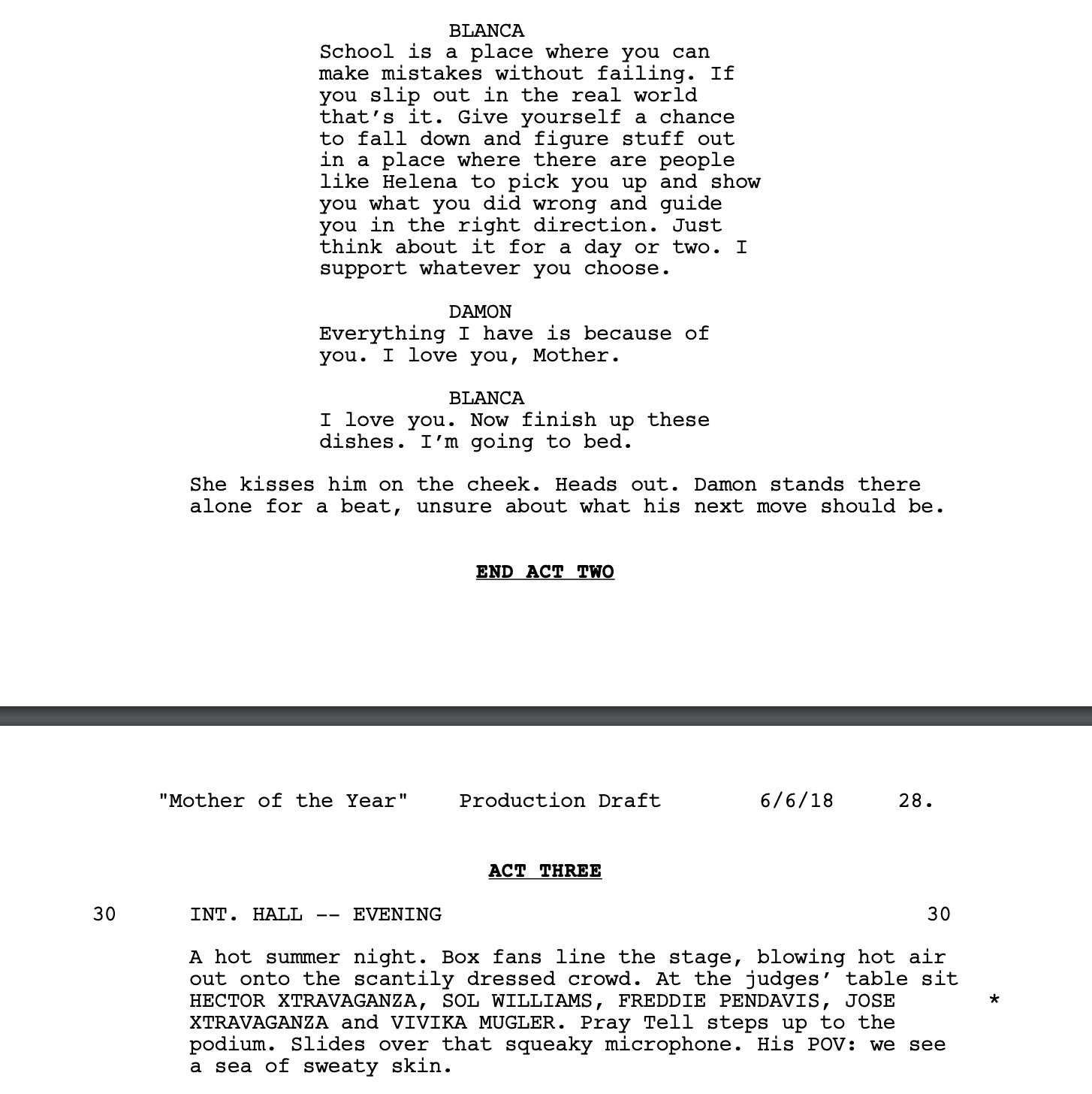FORMATTING YOUR SPEC SCRIPT WHILE SOCIAL DISTANCING: A PRIMER - PART 4
Well, here we are! It’s week 4 of our ongoing series to help you format your spec script. As long as fellowship season coincides with quarantine season, we’ll be here posting weekly examples of how several popular shows approach script format.
We plan to cover as many shows as possible. If we haven’t covered the show you’re spec-ing, or if you have additional, more targeted questions, please send us an e-mail at library@wgfoundation.org.
We can’t send you scripts in their entirety. We aren’t the copyright holders and we don’t have the right to distribute them beyond the physical library. We can, however, pour through the scripts and try to find you the information you need. Also, where possible, we’ll try to link to where award-nominated scripts and early drafts of pilots are available online.
ARROW (The CW)
Average page count: about 50
Average scene count: can range from 37 to 48
Broken into acts? Yes, 6.
Other things to consider:
Act breaks are formatted like ACT ONE underlined and centered; END OF ACT ONE also underlined and centered.
Act six / the last page ends with "END OF ACT ONE" underlined and centered.
The average act is about 6-10 pages.
Scene headings aren't formatted in any special way
Flashbacks are presented in italics
Here’s a small example of a fight/action sequence:
Read an early draft of the Arrow pilot here.
BETTER THINGS (FX)
Average page count: Somewhere in the 25-32 range (sometimes shorter, e.g. 22 pages)
Average scene count: 20-30
Broken into acts? No.
Other things to consider:
There’s very little description. The scripts are almost poetic in their simplicity.
Practically all of the scripts begin and end differently from one another.
See how Alice Cooper lyrics are literally written into the season 1 finale:
BROOKLYN NINE-NINE (NBC)
Average page count: 35
Average scene count: 29-40
Broken into acts? Yes, 4 (and 1 cold open)
Other things to consider:
Every script begins with a 1-2 page cold open. This is formatted with "COLD OPEN" centered, bolded and underlined. When it's over, "END OF COLD OPEN" centered, bolded and underlined.
Each of the four acts is formatted in much the same way. "ACT ONE" centered, bolded and underlined, then "END OF ACT ONE" centered, bolded and underlined. The exception is Act Four. When act four ends, on the last page of the script, we see "END OF SHOW" centered, bolded and underlined.
Scene headings are underlined.
Remember: keep it sweet with the jokes!
Read an early draft of the Brooklyn Nine-Nine pilot here.
HOMECOMING (Amazon)
Average page count: 30-ish
Average scene count: 15-20
Broken into acts? No
Other things to note:
Scene headings are in BOLD
There are usually very few scenes because it's a lot of dialogue and lots of two person scenes.
There’s also typically minimal description on the page
There's no specific teaser, but after the first scene or two, the writers specify "MAIN TITLES" in bold and in the center of the page.
Read an early draft of the Homecoming pilot here.
INSECURE (HBO)
Average page count: 34
Average scene count: 35
Broken into acts? No
Other things to consider:
Scene headings are underlined.
A familiarity with both the frustration and wonder of living in LA are a plus.
The show features lots of razor-sharp dialogue and a cynical, but very fun tone
Episodes end with END OF EPISODE underlined, bolded and centered.
POSE (FX)
Average Page Count: 45 or so
Average # of scenes: 31-45
Broken into acts? Yes, 4 (The first act is the longest, around 13-18 pages; the rest are between 7-12 pages)
Other things to consider:
Each new act is specified "ACT TWO" (or whatever act it is) centered at the top of the page, bolded and underline. When an act ends, it's "END ACT TWO" centered, bolded and underlined. The only act that does not have an act heading is Act One... the script just starts, much like a feature screenplay (but it ends END ACT ONE).
The end of the fourth act, which is the end of the episode ends "END OF EPISODE”
The scripts are incredibly dialogue-driven. The characters tell a lot of stories, almost like theatre. When you look at the page, there's big paragraphs of dialogue and minimal description.
Every bit of text is warm and compassionate -- and the episodes really focus on Blanca as the hero and as a mother.
FIN. See you next time!












